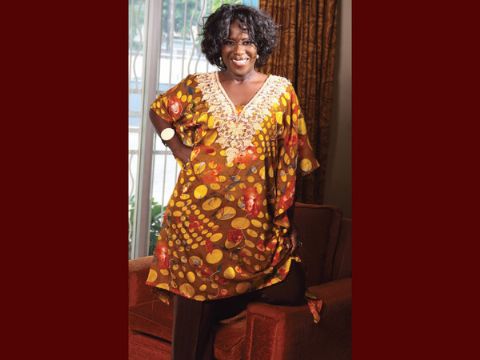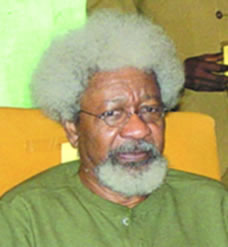
A large charcoal depiction of DaVinci’s Last Supper masterpiece, hangs proudly on the wall of Joke Silva’s office, Lufodo Productions – headquarters in Ikoyi. Wole Soyinka, Taye Solarin, MKO Abiola, Nnamdi Azikiwe and Ken Saro- Wiwa, amongst others, peer down from their seats at the table – an audience of spirited intellectuals, shoulders on which our nation stands.
Continuing the cycle of greatness, Joke Silva is a pioneer in the Nigerian motion picture and theatre industries, and is familiar with the importance of, promoting growth and rallying for reform from within.
She has witnessed the evolution of the television and theatre industry into what is now known all over the world as Nollywood. Her performance style still sets precedents in terms of quality and sincerity, and has inspired lives in over 20 years of acting.
A household name, she is critically acclaimed and well revered by her peers in the industry. So up-and-comers take notes, as we recount Joke Silva’s favourite roles over time, her plans to improve distribution standards within the movie industry and the evolution of her style sense.
A Cut Above
Joke Silva is not your typical Nollywood actress. She is also a business woman and you’re not likely to find her gracing the covers of tabloids or posing weekly at red carpet events; she is just not that into the Nollywood social scene.
“By the time the party starts I would have just finished work, and then it is time to be with the family. That comes first,” says the proud mother of two. Joke is in her late 40’s and possesses an air of electric, youthful exuberance.
She’s, all smiles, and engulfs the room with her energy, both in front of and behind the camera. She is married to Olu Jacobs, a fellow actor 19 years older than she is. But, she says, “It’s not like he’s some guy who is so much older and wiser than me, or a father figure, not at all. He is my friend and so we don’t really notice it. It is about having someone who accepts you for who you are.”
Characters both Young and Old
She’s played different roles in her time on the silver screen, most of which are characters much older than she. This affords her the double edged sword of being perceived as very wise and much older than she truly is.
As far as her favourite character portrayals, she has many. She speaks fondly of her role in the 2003 stage production of “A Husband’s Wife”, written by Tyrone Terrance. Her character struggles to accommodate the fact that her husband is looking for excitement after 20 years of marriage.
“He wants something new, something fresh and her arguments is she’s had children for him and has put up with this from him and put up with that, and who says she doesn’t want something fresh and new as well,” she explains.
“It is an amazing play. Even more amazing is that the writer then was so young and to have come up with something so insightful, I found that very exciting.”
Celluloid Dreams, Nollywood Reality
The Nigerian theatre industry thrived throughout the ‘80’s and made way for an equally successful television industry in the ‘90’s. These were the beginnings of Nollywood, the foundation the industry was built on.
“We can’t look at Nollywood in isolation to what went before it, it is a totality of a motion picture industry,” she explains. “The downturn in the economy in the early ‘90’s created an upsurge of piracy with celluloid, so it was safer to put the films onto video.”
Nigeria was brewing with political unrest, and many Nigerians began leaving in search of greener pastures abroad. Those who stayed behind found less incentive to venture across town into cinemas and theatres, so they stayed home to watch movies instead.
Thanks to technology and this mass migration abroad, a mushroom cloud of demand for Nigerian stories erupted globally and the Nigerian motion picture industry responded in kind.
With over 40 movies produced weekly, Nollywood is known globally, mentioned in the same breaths as Hollywood and Bollywood. “There is a special energy about Nigerian stories that you don’t find in any other African story. It’s our unique way of storytelling.”
Like Fine Wine
Her style is fun, elegant, and afrocentric.
Joke prefers dressing in traditional interpretations of Western silhouettes, with consideration for the fuller figure. Her signature items include big coral and glass beaded necklaces, Ankara and chiffons in chocolate brown, with accents of embroidered detail.
Joke explains that getting older can be daunting, yet exciting in a conquering-new-frontiers kind of way. “Reaching 40 was fantastic for me. I just found myself with so many new dreams, so many new mountains to climb, and it is still very exciting to make them a success.”
“In the early years I really wasn’t confident with what I wore. My dress sense was awkward,” she admits chuckling. “Through my 20’s and 30’s I had a sense of what I wanted, I just could not mix it properly. By my mid 30’s I had a more comfortable sense of self and now I put things together much better.”
“Our fashion is such that there is something fun for all ages. We are lucky to be in a society that does not particularly mind a fuller figure,” she professes. “Style is about looking good and feeling comfortable.”
Fighting Piracy and Mediocrity
Quantity and quality are not mutually exclusive terms even in Nollywood. Joke explains, “Because the entry level qualifications in the business are so low, you find many people get in and haven’t the foggiest idea of what it is about.”
These hopefuls come in droves, wanting to be actors and make fast money, but they do not reinvest in the industry when the payoff comes. Without sustainability, the industry will implode. “Pirates are having a field day!” she exclaims, so she and her husband have teamed up to fight these issues head on by training up-and-comers, targeting distribution and advocating change on the judicial level.
Joke Silva and Olu Jacobs own Lufodo Productions, a parent company under which they run an academy of performing arts and a distribution company. “If we can fight piracy and train people, we can get better investments to pump the kind of money needed for the industry to thrive and it will create a trickle down event in the value chain.”
Nigerian Meryl Streep
Joke Silva has inspired an entire generation of actors and actresses, solidifying her status as one of the most respected in the industry.
So when I ask her what it is she thinks the audience responds to when they see her performance on screen, she chuckles heartily and says: “Usually, what they say is the naturalness, but I think it’s the audience you would have to ask.”
As an aspiring actress, Mrs Joke Silva to me is like those sticks that guide a young tomato plant. My wish is to learn under her….


















